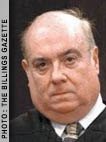Roy Atchison: On the Paper Trail of a Pedophile, Part 1

- Assistant U.S. Attorney Roy Atchison
This blog entry is the first of a series of articles on John David Roy Atchison. Atchison, anAssistant U.S. Attorney in the Northern District of Florida, Pensacola office, was arrested in September 2007 on charges relating to pedophilia. He committed suicide in federal prison in October 2007. Arrest and suicide were not foregrounded by the Department of Justice in the Bush administration. The first articles, based largely on FBI material obtained under FOIA, will focus on the criminal acts and their context in 2007 in the Pensacola office.

- Federal courthouse, Pensacola FL
This is not the story of a man who engaged in pedophilia for years or decades before being caught. It is the story of a man whipsawed by the strain of living up to a high-achieving family rooted in Birmingham, Ala., whose high-functioning connections assisted him for years in developing a career for which he turned out not to be suited. On Sept. 16, 2007, Assistant U.S. Attorney John David Roy Atchison, serving as a federal prosecutor in the Northern District of Florida, was arrested on credible charges of basically pedophilia. Atchison committed suicide in federal prison Oct. 5.
A dead pedophile might not sound like a tragedy. But Atchison was thought to be participating in a pedophile ring, and his death removed a useful informant from law enforcement resources. The question of how he was enabled to kill himself rather than being preserved for justice is one of the loose ends left hanging in his case. This article series will look at the case itself, at how Atchison attained his federal career, and at the easy prison suicide in 2007.
The legal case begins in August 2007, when an officer identified only as part of the Detroit Deputized Cyber Task Force, posing online as a divorced mother of two small children, was Instant Messengered by Yahoo! Member “fldaddy04.” As the Federal Bureau of Investigation notes, when the TFO [Task Force Officer, name redacted] added the user to her buddy list, the name “John Davidson” replaced “fldaddy04.” By Sept. 12, the FBI had determined that ‘Davidson” was actually Atchison, married since 1983, who lived with his wife, a high school teacher and cheerleading coach, in Gulf Breeze, Florida, and was president of the Gulf Breeze Sports Association as well as an Assistant U.S. Attorney.

- GBSA
‘Davidson’ identified himself in Internet chat as a male interested in “family fun,” chat room names fldaddy04 and aaronpottypants. According to the FBI, “Davidson stated in the chat session that he’s extremely interested in traveling to Detroit to have illicit sexual contact with [the TFO’s] fictitious five year old daughter.”
More specifically, “From August 31, 2007 until September 13, 2007, the subject [Atchison] chatted on a regular basis with the Detective and in these chats very graphically detailed his desire to engage in oral and vaginal intercourse, as well as sodomy, with the five year old ‘daughter’.” Moving from chat to action, “On September 4, 2007, the Detective had a chat with the subject and was informed the subject had reserved a flight to Detroit, Michigan, to arrive at 4:52 PM on September 16, 2007.” Atchison further told the FBI agent to tell her fictitious daughter that “you found her a sweet boyfriend who will bring her presents.”
“On September 12, 2007, the writer determined that the subject was flying from Pensacola to Houston, for a connecting flight to Detroit,” and Houston FBI was requested to keep an eye on Atchison when he debarked in Houston and boarded Continental flight #1088 to Detroit shortly after noon. He was arrested by waiting feds, Wayne County Airport Police, and deputies of the Macomb County, Michigan, Sheriff’s Office at Detroit Metropolitan International Airport about 5:00 that day, without incident according to the publicly released statement from Detroit FBI.
Atchison was indicted Sept. 17, charged with one count each of attempted enticement/coercion, aggravated abuse, and travel with intent to engage in illicit sexual conduct with a five-year-old girl, all in violation of Title 18, U.S. Code. Search warrants covering his property and premises including the home on Shoreline Drive in Gulf Breeze were signed.
Items seized by the FBI include the evidence drearily predictable in such cases—“12 pair of girls panties w/ flower & cartoon print,” for example, “Found under dresser, under bottom drawer of dresser in closet.” Atchison’s children including his daughters were grown, and no minors lived in the house. Note: A daughter denied credibly, repeatedly and consistently to the FBI that Atchison had ever harmed her or touched her or her sister or friends inappropriately, joining the community in shocked surprise at the revelations. No indication of pedophile activity turned up among Atchison’s relatives, acquaintances or co-workers. However, Managing Assistant U.S. Attorney Dixie Morrow told investigators that Atchison “had at some point in the past year or two, made an electronic request through DOJ for authorization to attend a child molestation seminar,” the request “apparently denied as it did not fit with his assigned duties in working civil and forfeiture matters.” Atchison’s work for the DOJ was largely real estate—dealing with forfeited property–stemming from similar work he had done for the General Services Administration and as landlord of a modest property in Birmingham.
Further evidence in the house included “four cloth and 1 plastic diaper undergarments,” “found in blue plastic tub.” Authorities also took four guns, with permission, for safekeeping—a Smith & Wesson revolver, two 12-gauge shotguns, and a Chinese semi-automatic—and confiscated Atchison’s passport. Items seized from his person when he got off the flight included, along with the Dora the Explorer doll with accessories and one doll outfit, one (1) tiger stuffed animal, one (1) tube of CVS Petroleum Jelly, one (1) Cialis pill, and four (4) unknown pills.
Evidence at Atchison’s office was easy to find: “Upon entry to the office at approximately 1:22 PM, a shopping bag containing three sets of doll clothes was observed resting on the desk chair.” The Walmart bag “was determined to contain three boxes of “Dora the Explorer”. . . “Dress Up Adventure” clothes.” Bag and contents were seized as evidence.
Doll clothes purchased by a federal contractor
If investigators wondered why Atchison would have revealing objects in his office, the puzzle was quickly solved: The doll clothes had been purchased for Atchison by an employee in the same office. “[Name redacted, a co-worker] advised that the bag contained items purchased on Atchison’s behalf, by staffer [name redacted]. She had placed the bag on his chair upon first entering the office in morning of September 17.”
The unnamed employee was with contractor Forfeiture Support Associates, which provides asset-forfeiture services for various DOJ offices. “In this instance, [name redacted] worked for the Pensacola Office of the U.S. Attorney,” preparing documents for forfeiture proceedings, a specialty of Atchison’s. “She began working in this office on January 12, 2007. She primarily supported Civil Attorney J. D. Roy Atchison and had daily contact with him.”
According to the FBI, Atchison had in some ways a notably friendly workplace:
“On Friday, September 14, 2007, [name redacted] had occasion to enter Atchison’s office and ask if he had anything for her to work on while he was out of town. She understood that he was leaving town over the weekend to visit his brother . . . She could see that Atchison was on the internet looking at a shopping site. Atchison said that he was trying to find Dora doll outfits for his niece. He said she has the doll, but needs the outfits. He showed [name redacted] a red outfit that he had in the office, . . . “Holiday Dora”. [Redacted] and Atchison discussed locations around town where the outfits could be purchased . . . [Redacted] suggested some online sites which might have the outfits he was looking for. It was apparent that he was already looking for these on the internet and she believes this was on his work computer, a desk top.” [emphasis added]
One can only imagine the feelings of the FBI transcriber, taking down this friendly discussion about buying doll clothes between a pedophile AUSA and a contract employee. At a time when many U.S. office workers are lucky if a colleague is willing to swing by Starbucks on the way to the office,
“During the discussion, [redacted] told Atchison that she would keep an eye out for the outfits this weekend. He asked that if she saw some to let him know. She suggested that if she saw some, she would pick them up and he could just pay her back. He said ok, that would be great.
They then discussed what outfits were out there. [Redacted] thought there were about four. Atchison told her there were several different ones out there. He said he could use a couple if she saw any.”
[The press office for the Northern District of Florida, contacted by phone and email, has not yet answered questions about Atchison.] By policy and federal law, personnel matters are generally not discussed. The identity of the helpful contract employee has not been disclosed. The company, Forfeiture Support Associates, does extensive work for federal agencies. Contacted with questions and requests for comment, Vice President for Business Development Jack Hunt, sounding unsurprised, refers a journalist to COO Cal Dixon, also unflapped, who refers questions to HR Manager Nicky Rogers. A telephone recording indicates that Rogers is on vacation until Sept. 14.
Mission accomplished: “Over the previous weekend, [name redacted] was out doing some personal shopping and saw several Dora Doll outfits. She purchased three of them specifically for Atchison. On Monday morning she placed the bag in his office. She may have put the bag under his desk.”
Tomorrow, Part 2: “The friendliest lil ole workplace in Florida.” Further context from the DOJ, 2007.









